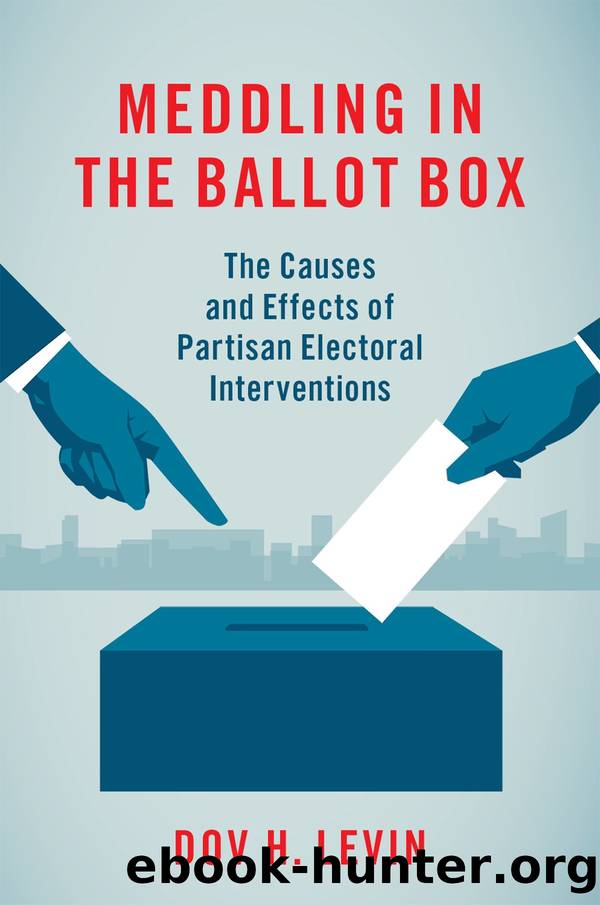Meddling in the Ballot Box: The Causes and Effects of Partisan Electoral Interventions by Dov H. Levin

Author:Dov H. Levin [Levin, Dov H.]
Language: eng
Format: epub
Tags: Political Science, Comparative Politics, Political Process, Campaigns & Elections, International Relations, General
ISBN: 9780197519905
Google: O3_4DwAAQBAJ
Publisher: Oxford University Press
Published: 2020-12-15T00:00:00+00:00
6.5 Discussion and Conclusion
The results found here indicate that John Adams was quite justified in his worries about the likely effects of foreign electoral interventions on the targeted elections results. Three of the four hypotheses tested here were supported. Overall, electoral interventions seem to substantively benefit the aided candidate or party (H4). Of the two main subtypes of electoral interventions, overt interventions are significantly more effective than covert interventions in both the substantive and the statistical sense(H5). However, no significant robust differences have been found between interventions in favor of challengers versus incumbents (rejecting H7). Likewise, interventions done in founding elections (such as the U.S. 1796 elections),47 unlike in later elections, do little to benefit and in fact usually harm the aided candidate/party (H6). Some preliminary evidence was found that the overall magnitude of such interventions may matter with very large interventions having perhaps greater effects. Furthermore, as to the specific subtypes of intervention, some very preliminary and tentative evidence was found for the special effectiveness of tailored public concessions to the target.
These results indicate that electoral interventions, with some exceptions, seem to be an effective foreign policy tool benefiting those they are designed to help. Given the average effect found here (of about 3% change in vote share), an electoral intervention will not always assure victory for the great powers' preferred candidates. Likewise, as in all statistical averages (or average treatment effects), actual effects in particular cases may vary. However, as shown in some examples in Table 6.1, under many commonly occurring situations at national-level elections, partisan electoral interventions can and do swing elections. The evidence presented in this chapter, showing little change in the effectiveness of electoral interventions over time, suggests that in the foreseeable future, partisan electoral interventions will continue to be an effective way for great powers to determine the leadership of other states, regardless of whether their targets are governed by "competitive authoritarian," partially democratic, or fully democratic regimes. These results also provide further---and cross-national---support for the finding of Corstange and Marinov (2012:664--669) that no popular backlash effect existed in their survey experiment of an overt intervention.
Those things said, these results also indicate, quite ironically, that the "model scenario" for electoral interventions, the one deemed by many as the most morally acceptable for such interventions by the U.S. (e.g., see Carothers 1996:102--103), is the one when it will be unable to do much to "tip the scales." In other words, when the U.S. helps inexperienced yet well-intentioned pro-democracy parties facing long odds in a competitive election either against an entrenched competitive authoritarian regime or strong and more authoritarian forces within their society, they are unlikely to actually benefit in practice from such help.
To give a recent illustration: after the fall of the Mubarak regime in February 2011 some members of the U.S. foreign policy community called on President Obama to intervene in favor of the liberal groups in the May 2012 Egyptian presidential election, the first competitive executive elections in Egypt since 1950 (Takeyh 2011; Krauthammer 2011; Satloff 2012; see also quotes in Carothers 2011).
Download
This site does not store any files on its server. We only index and link to content provided by other sites. Please contact the content providers to delete copyright contents if any and email us, we'll remove relevant links or contents immediately.
| Elections & Political Process | Ideologies & Doctrines |
| International & World Politics | Political Science |
| Public Affairs & Policy | Specific Topics |
| United States |
The Secret History by Donna Tartt(16622)
The Social Justice Warrior Handbook by Lisa De Pasquale(11489)
Thirteen Reasons Why by Jay Asher(7788)
This Is How You Lose Her by Junot Diaz(5769)
Weapons of Math Destruction by Cathy O'Neil(5036)
Zero to One by Peter Thiel(4824)
The Myth of the Strong Leader by Archie Brown(4789)
Promise Me, Dad by Joe Biden(4447)
Beartown by Fredrik Backman(4415)
Stone's Rules by Roger Stone(4415)
How Democracies Die by Steven Levitsky & Daniel Ziblatt(4398)
The Fire Next Time by James Baldwin(4342)
100 Deadly Skills by Clint Emerson(4076)
A Higher Loyalty: Truth, Lies, and Leadership by James Comey(4032)
Rise and Kill First by Ronen Bergman(4012)
The David Icke Guide to the Global Conspiracy (and how to end it) by David Icke(3881)
The Farm by Tom Rob Smith(3872)
Secrecy World by Jake Bernstein(3782)
The Doomsday Machine by Daniel Ellsberg(3730)
